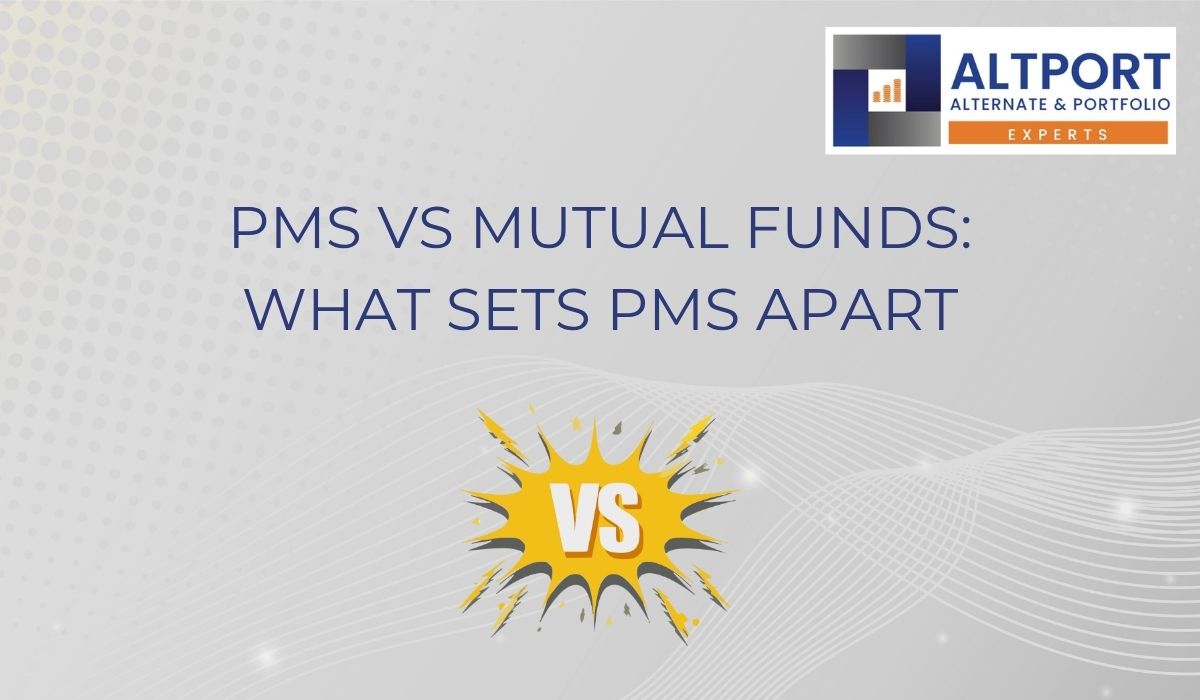When it comes to investing, two instruments usually crop up in discussions between investors: mutual funds and portfolio management services (PMS). On the face of it, they seem to be similar, as both are handled by experts and aggregate money for investment. But on closer inspection, PMS and mutual funds differ vastly in structure, personalization, flexibility, and fitment with investors. The key to being able to make smart choices about where to invest your money is understanding these distinctions.
What Are Mutual Funds?
Mutual funds are investment schemes where money is collected from a large number of people to invest in securities such as stocks, bonds, or other instruments. Asset management companies (AMCs) manage mutual funds, and SEBI governs them. Mutual funds are marketed for retail investors, and they provide affordability and convenience. With comparatively low entry levels, mutual funds enable people to invest in a diversified portfolio without the need for huge amounts of money.
Mutual funds have a standardized investment approach. All investors in a specific scheme hold units of the same portfolio, and hence there is no tailoring. They are ideal for those who like uncomplicated, transparent, and regulated products.
What Is PMS?
Portfolio management service is customized investment advice provided by SEBI-registered portfolio managers. PMS is different from mutual funds in the sense that it is built around a specific investor’s risk tolerance, investment horizon, and financial objectives. The minimum to invest is significantly higher than in mutual funds, generally at INR 50 lakh.
In PMS, the investors themselves own the securities in their portfolio instead of holding units of a collective fund. This brings more transparency and control, as you are able to view clearly which assets are included in your portfolio. PMS is meant for high-net-worth clients (HNIs) and investors who want a personalized and strategic method of managing wealth.
Differences Between PMS and Mutual Funds
1. Customization
Mutual funds provide a “one-size-fits-all” approach where all investors in a scheme have the same portfolio. PMS, however, constructs portfolios that are tailor-made for each investor. For instance, if an investor wants a higher proportion of equity with an emphasis on certain sectors, PMS can be so designed.
2. Ownership of Securities
In mutual funds, you hold units of the scheme, not the original securities. PMS offers direct ownership of securities, i.e., the investor has shares, bonds, or instruments held directly in his name. This direct ownership provides improved visibility and accountability.
3. Minimum Investment
Mutual funds are available to nearly everyone, with entry levels as low as INR 500. PMS, on the other hand, is for HNIs, with a regulatory threshold of INR 50 lakh. The high entry level of PMS guarantees that PMS shall continue to be beyond the reach of investors with lower capital.
4. Flexibility and Strategy
Mutual fund managers have to follow the mandate of their scheme rigidly. This constrains them. PMS managers, however, can dynamically change strategies as per market conditions and investor objectives. This makes PMS extremely popular for those searching for customized wealth creation.
5. Transparency
Mutual funds disclose their portfolios periodically, often with a lag, and investors cannot track real-time changes. PMS provides complete transparency since investors directly hold the securities in their demat accounts. This means you can monitor your portfolio anytime without waiting for disclosures.
6. Costs and Fees
Mutual funds tend to charge less, as expenses are distributed over a large number of investors. PMS charges more as the service is customized and involves management fees and performance-linked fees. Nonetheless, for most HNIs, better returns and strategic orientation often prove worth the expense.
7. Tax Implications
In the case of mutual funds, one is taxed when you sell your units. In PMS, because securities are held directly, taxation is done individually on each buy or sell action in your account. Although more accounting has to be done, it also provides scope for tax efficiency through techniques such as tax harvesting.
Advantages of PMS over Mutual Funds
- Personalized Approach: Portfolios are designed based on your objectives, wishes, and risk tolerance.
- Expert Management: PMS is managed by experienced professionals with an emphasis on providing better returns.
- Diversification: Exposure to a variety of asset classes and strategies that are not available through mutual funds.
- Real-time Transparency: Direct investment in securities provides unparalleled transparency in monitoring your portfolio.
Who Should Opt for PMS?
PMS is suitable for investors who:
- Have large investable capital (minimum INR 50 lakh).
- Are looking for customized strategies rather than standardized ones.
- Want more control and transparency in their investment.
- Are willing to take a higher risk in the hope of getting a higher return.
For those with smaller amounts of capital or who seek something easy to go with, a mutual fund is still a good option. But for HNIs who prefer flexibility, customization, and professional advice, PMS is a better option.
Conclusion
Both mutual funds and PMS are their own way in wealth management, but the decision would largely be based on your investment goals, risk tolerance, and investment horizon. Even though mutual funds are available at large and are standardized, portfolio management services come with exclusivity, transparency, and personalized service.
At ALTPORT, we offer a process-driven platform for AIF, PMS, and Gift City Fund investments. With in-depth knowledge and customized strategies, our professionals assist investors in managing tricky markets and generating wealth through customized solutions.

 Book A Meeting
Book A Meeting +91 95616 10108
+91 95616 10108 WhatsApp Us
WhatsApp Us Book A Meeting
Book A Meeting




